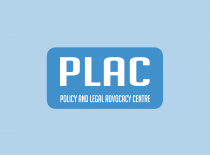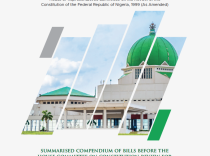The Senate on Tuesday, May 30th 2017, passed the Bill on Mutual Assistance in Criminal Matters between Nigeria and other Foreign States – an Executive Bill, which was presented to the Senate on February 16th, 2016.
Presenting the report of the Joint Committee on Judiciary, Human and Legal Matters; Anti-Corruption and Financial Crimes; and Foreign Affairs, Chairman of the Joint Committee, Sen. David Umaru (APC: Niger) stated that it had developed a legislative framework that allowed wide consultation to justify passage of the Bill under consideration. These included the convening of a stakeholders meeting to critically evaluate the provisions of the Bill, the carrying out of a comparative assessment with other jurisdictions ahead of the public hearing; and the conduct of a public hearing in order to collate views of members of the general public.
Sen. Umaru in his submissions emphasized that the Bill sought to among other things, facilitate voluntary attendance of persons in the requesting State; effect temporary transfer of persons in custody to assist in investigations or appear as a witness; identify, trace, freeze, restrain, recover, forfeit and confiscate proceeds, property and other instrumentalities of crime; obtain and preserve computer data; and render assistance not contrary to the law of the requesting State.
Furthermore, he mentioned that during the conduct of the public hearing, various stakeholders had unanimously supported the passage of the Bill by the National Assembly which they agreed would:
- Assist Nigeria in the repatriation of looted funds and other proceeds of crime stashed away in foreign countries;
- Enhance effective prosecution of border crimes and assist in the reduction or elimination of offences with cross border dimension including terrorism and terrorist financing, money laundering, advance fee fraud, proliferation of weapons of mass destruction, etc;
- Enable Nigeria to obtain evidence and statements, identify suspects and witness, transfer suspects, etc;
- Assist in combating corruption and improve the image of the Country in the international community;
- Serve as an avenue for Nigeria to be admitted as a member of the Financial Action Task Force(FATF);
In view of the aforesaid highlights, the Committee recommended to the Senate as follows:
- That the passage of the Bill would strengthen the fight against terrorism, corruption, economic and financial crimes, money laundering and other related offences;
- That the enactment of this law is paramount to the Government’s anti-corruption drive as it seeks to eliminate territorial jurisdictional constraints in the prosecution of cross border crimes;
- That the globalization and advancement in information and communication technology made it imperative for a legislation of this nature to be put in place, in order to promote cooperation for the prosecution of cross border offenders and transnational organized crimes;
- That the passage of the Bill will restore the confidence of foreign investors, thereby attracting foreign direct investments which would boost the economy;
- That the subject of the Bill deals with a matter of great importance to Nigeria and it is a great improvement on the Mutual Legal Assistance in Criminal Matters in the Commonwealth (Enactment and Enforcement) Act, 2004;
- That the Mutual Legal Assistance in Criminal Matters in the Commonwealth (Enactment and Enforcement) Act, 2004 that is operational in the commonwealth countries is limited in scope, hence, the need to enact a legislation which seeks to provide a wider spectrum for the prosecution of cross border crimes; and,
- That as a deliberative and responsive law-making body, it is expedient for the Senate to enact legislations that seek to encompass new global trends and emerging dynamics in jurisprudence.
In addition, he mentioned that the Committee had taken cognizance of the fact that there was no specific legislation in place to address the broad spectrum of criminal matters that require mutual assistance or international cooperation. He added therefore, that the Bill if passed would address the current lacuna in the law. Lastly, he said that the Committee had amended four out of eighty-eight clauses contained in the Bill.





